On the Season That Never Was
Wherein I get out all the 'yuck' from a Friars season we'd all just as soon forget
I am tardy in issuing this port-mortem for the Providence College 2024-25 season, especially when there is suddenly so much excitement about the new pieces Kim English and his staff are bringing to Friartown for next season.
But there will be time to evaluate next season’s roster (should life allow me enough space to write, something that was rare this season), and after all, the incomparable Kevin Farrahar has already done us a great service with his breakdowns of incoming transfers Jason Edwards, Jaylin Sellers, Cole Hargrove, Daquan Davis and recruit Stefan Vaaks ($$). And now, there’s a podcast episode on PC’s “wildest Portal day ever.”
With the season finally ending and no more losing Friars performances in my immediate future, I am inspired to put to words what happened in a Friars season that arrived stillborn and yet was unending in its disappointment. It never really got started; it fizzled in February; it barely showed up at the Garden; the vision English put together last spring failed to materialize. It was the season that never was.
This season will be remembered first for how Bryce Hopkins’ recovery, return, reinjury and eventual redshirt overshadowed it. The Friars’ 5-0 start against weak competition was always evaluated against what this supporting case would look like after Hopkins’ imminent return. New arrivals Christ Essandoko and Jabri Abdur-Rahim were mercurial and the offense overall was stodgy, but a string of preseason injuries made the early lack of cohesion understandable. The defense through five games looked stalwart, and soon Hopkins would return to — we hoped — juice the offense.
Then came the Bahamas. I was so excited for this tournament, but as I stood in the cold, killing time at the playground while my 4-year-old explored on that Thanksgiving Wednesday, I saw the report that Hopkins would not play vs. Oklahoma (and I think I lost a glove at the playground that day, too). A ballroom floor was determined to be a poor venue for #thereturn, but ESPN focused on Hopkins’ #mindset and the PC staff did little to dispel that narrative.
Meanwhile, after a frustrating loss to Oklahoma, the season imploded on Thanksgiving against Davidson — the Friars shot an ugly 27% on 2-pointers while allowing the Wildcats to cut and shoot us out of the gym. After a quick turnaround, PC was throttled by Indiana on Black Friday as the defense was suddenly taking on water. Before Hopkins had played a minute, the season was on the brink.
Hopkins finally did return in a cathartic evening against BYU, but the euphoria of that peak performance quickly turned to exasperation over a squandered lead in Kingston the following Saturday. An unlikely comeback win at DePaul to open Big East play did little to assuage the notion that this team just didn’t have it.
The offense wasn’t good and the defense was showing cracks. Wesley Cardet, the hyped transfer from Chicago State, was a fine piece but not the shot-creator needed. After a strong start to the season, Corey Floyd had taken a backseat with Hopkins’ return. Jayden Pierre and Bensley Joseph were hit or miss from night to night. Abdur-Rahim continued to be in and out of English’s doghouse, and, though Oswin Erhunmwunse had started to emerge, the center spot was still a problem.
And, as it turned out, that ugly win in Chicago would be the last time Hopkins would play for the Friars, with talk of unheeded minutes restrictions compounded by a reinjury that night. He was scratched first from a dismal loss at Mohegan vs. St. Bonaventure and then for the rest of the season.
The loss to the Bonnies removed any flickering hopes of an NCAA Tournament bid for these Friars, and so the rest of the season became a failed attempt to build momentum toward next season. We didn’t know Hopkins was done at that point, though the handwriting was on the wall after Big East home-opening losses to St. John’s (where the Friars squandered a 16-point lead and lost on a Zuby Ejiofor buzzer beater) and Marquette (where they never showed up at all).
Reports indicated that, by the time PC visited Storrs to open 2025 at UConn, the team knew that Hopkins was done, and that clarity (or coincidence) led to the team’s best stretch of basketball, a 4-4 run that included one-possession losses at UConn, St. John’s and Villanova to go with four of the squad’s six conference wins on the season.
The Friars ran out a top-30 offense during that stretch, dialing down the 3-point volume, while embracing the strength of big guards like Cardet, Floyd and Ryan Mela to get into the post and mid-range. Joseph and a resurgent Abdur-Rahim surrounded them with shooting, and Erhunmwunse was becoming a menace on the offensive glass. The culmination was a 19-point comeback at St. John’s behind 27 scorching points from Abdur-Rahim. It wasn’t enough since Kadary Richmond was allowed to walk into a 15-footer for the win, but it was a sign that this team had fight.
But that would be the last performance in a Friars uniform for Abdur-Rahim (barring a miracle waiver to bring him back next season), and even before the St. John’s game, Cardet had suffered the knee injury that would mostly shelve him for the season’s duration (he played 75 minutes over the final 14 games).
Without those key pieces out for most of February and Mela running into a freshman wall as he started to become more of a focus of opposing scouting reports, English relied more and more on his small guards. Joseph, for his part, had a remarkable season, shooting 40% on a high volume of threes, but Pierre entered a prolonged slump in mid-January that never ended. Pierre shot 29% on six 3-point attempts per game while playing 35 minutes per game over the season’s final 15 games. Both Joseph and Pierre were miscast whenever they had to be lead ballhandlers, and it’s why PC was last in Big East play in coughing it up. Sloppy play mixed with low-pressure defense meant that PC turned the ball over more than its opponents in 18 of 21 Big East games. That shot volume deficit proved impossible to overcome.
With English relying so heavily on two small guards on offense and without a big to help Erhunmwunse, PC’s defense was too small (the Friars were the shortest team in the Big East, weighting height by minutes played) to hold up in the Big East, falling to 170th nationally from the St. Bonaventure game to season’s end. After the comeback fell short in the Garden, there was, as it turned out, only one more win left on the schedule, a 13-point victory over Villanova in mid-February (the game that followed English’s first ejection during a home loss to Xavier). Providence immediately followed the Villanova win with a sorry performance against Ed Cooley and Georgetown, a 21-point defeat in a game where the Hoyas didn’t have potential lottery pick Thomas Sorber. Marquette then demolished the Friars, a game in which PC allowed 17 3-pointers while making only 19 total field goals in a 30-point loss.
At that point, PC was playing out the string. There would be no late-season run to build momentum into the offseason. A three-point home loss on Senior Night to DePaul was the final indignity, if you don’t count being the very first team to be eliminated from the Big East Tournament.
PC’s 96th-place finish in Ken Pomeroy’s rankings was the Friars’ worst since Ed Cooley’s first season and worse than any Keno Davis season. PC’s 20 losses were the most since the season before Rick Pitino arrived (1984-85). Meanwhile, Pitino was the double-Big East champion at St. John’s (and national co-Coach of the Year), and English’s replacement at George Mason, Tony Skinn, was named Atlantic 10 Coach of the Year.
That all seems pretty dire, and, indeed, starting with the no-show vs. Davidson on Thanksgiving, this was a season where we were forced to question everything we thought we knew about the program. In particular, the defense that seemed like a potential staple of Kim English’s system suddenly appeared to have left Friartown with Devin Carter, Josh Oduro and Ticket Gaines. The offensive philosophy of threes and shots at the rim was applied in principle but without effectiveness.
Still, it’s hard to separate the signal from the noise. I call this the season that never was because we never really saw the vision, because we saw so little of Bryce Hopkins and because the misevaluations and/or misutilizations of Essandoko, Cardet and Abdur-Rahim meant “13 dudes” never materialized.
English has seen both his Friartown seasons torpedoed by Hopkins injuries, and with Hopkins’ departure to St. John’s, at least that won’t be the case for a third straight year, a relief to me. When you build a roster around an all-Big East talent and only get three games out of him, and then you see two of your four portal adds barely play in February and March, the overall performance is predictable. Programs with more resources and more accomplished coaches or both) found this winter to be harsh, and none of them had to try to navigate without an injured cornerstone talent like Hopkins. Miami, Seton Hall, NC State, Dayton, Syracuse, Virginia Tech, LSU, Kansas State, Rutgers, Villanova, Ohio State, Washington, Cincinnati — this season laid waste to all of them.
Now all of Friartown should be entering #PortalSZN with open eyes. Last spring, I bought into the Essandoko hype as a multitalented big with the ability to stretch the floor. As wrong as I was, the staff paid the price. Whatever we should have expected from Cardet, we needed a primary shot creator and he wasn’t that. The staff’s evaluations need to be better this spring, and we should look at both the Portal haul and the staff’s ability to get the most out of it with skepticism.
Finally, how do the staff and its leader improve? English is a proponent of growth mindset, and though young people can be stubborn, they also have supple minds, capable of remarkable change and improvement. To quote Mike Stanton’s January 2024 Rhode Island Monthly piece on English (where he was paraphrasing Carol Dweck’s 2006 book), “People with a growth mindset embrace failure as part of learning and believe they can get better by challenging themselves in the face of adversity.”
Adversity arrived in force this winter, and English, facing the most important 12 months of his coaching career, has responded with a roster purge, impressive early Portal and recruiting commitments, and, per rumors, potentially adding a veteran assistant like Frank Haith. We await with hope to see whether the challenge of this adversity and English’s response to it will translate to success on the floor next winter.
To paraphrase Coach English after the BYU win, this post was my version of a postgame film session after a loss: “It’s really heavy and I’m heavy — it’s some yuck.” But now I’m flushing it and moving on to what’s next. So what, no what?

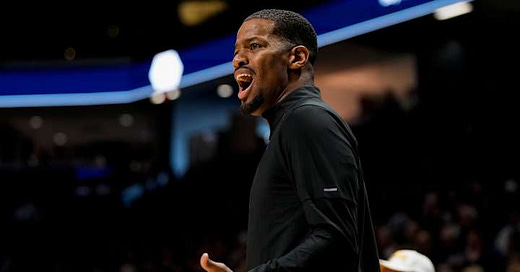



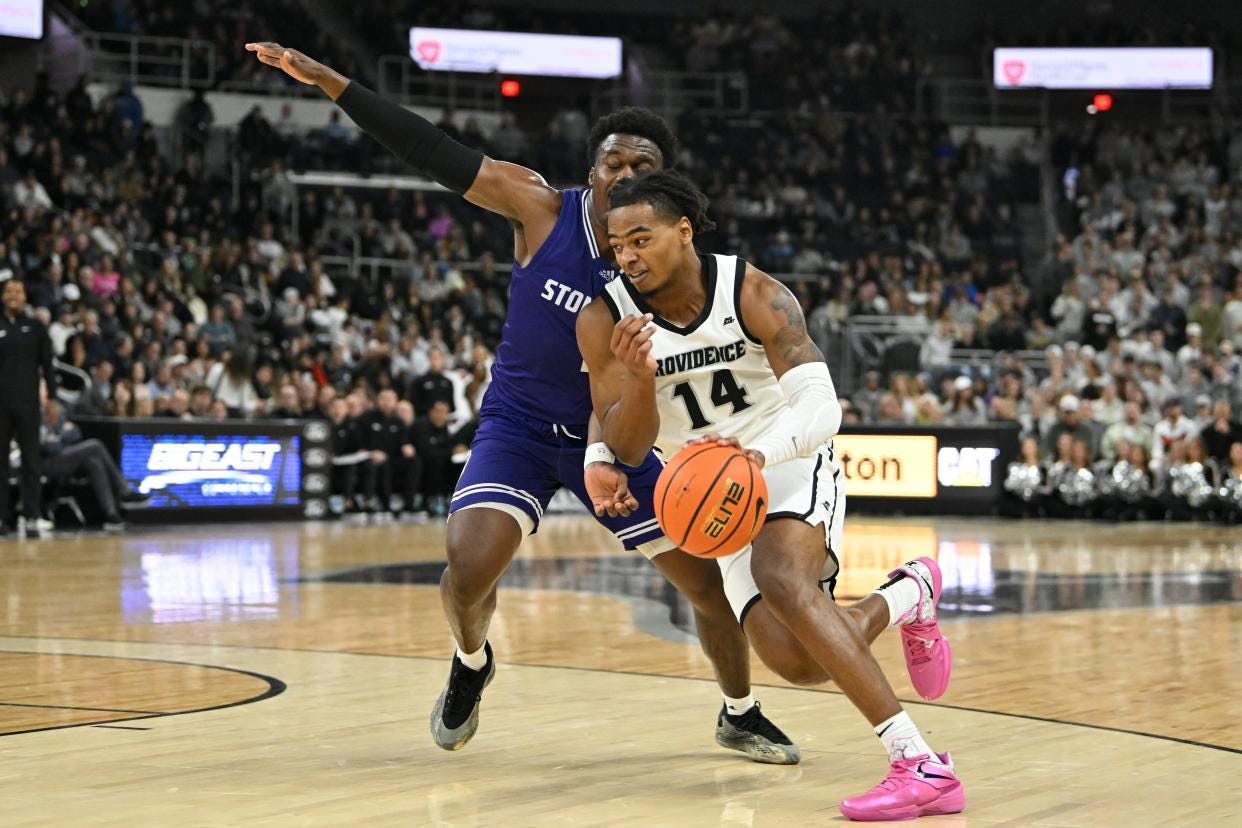
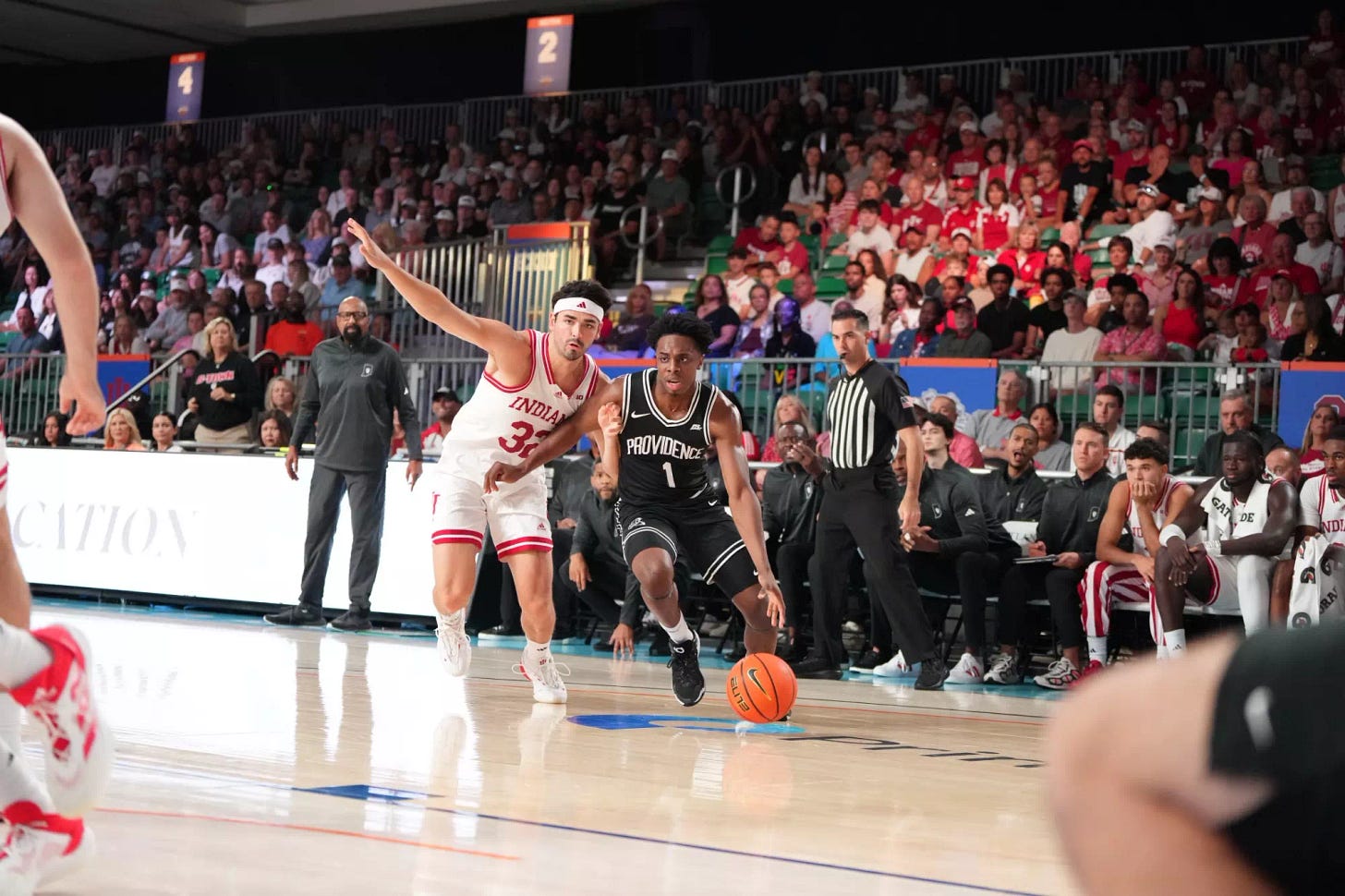

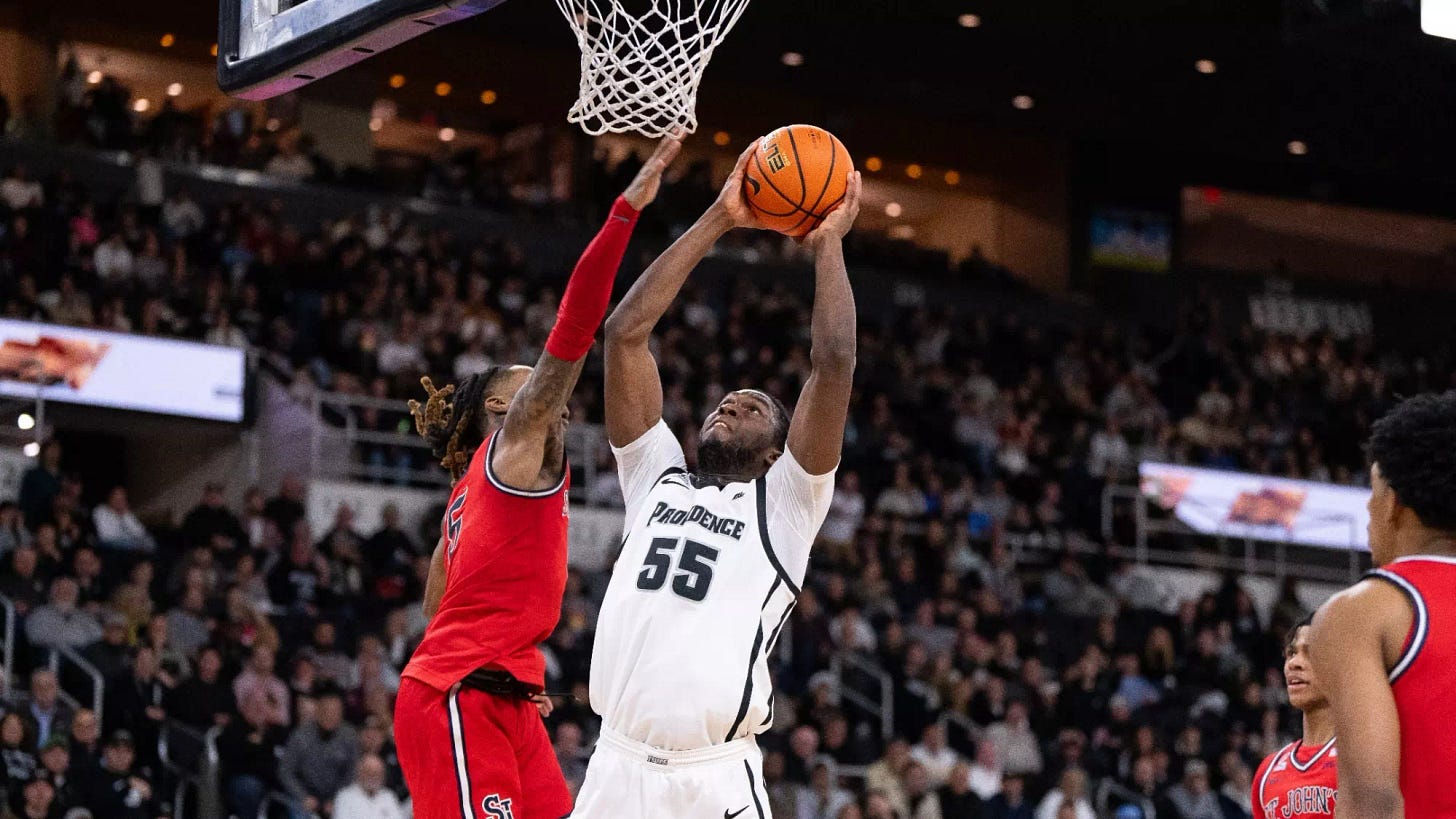
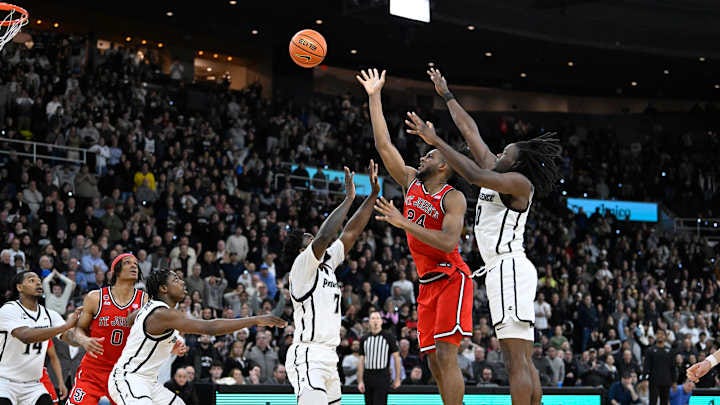


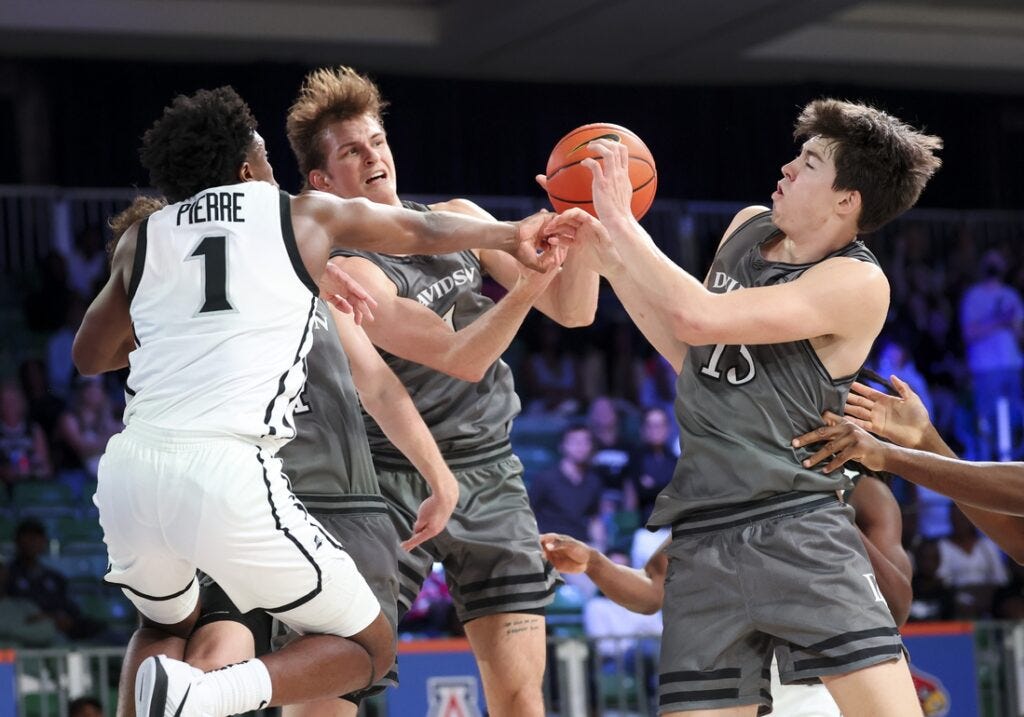

You are a magnificent writer.